Filter by
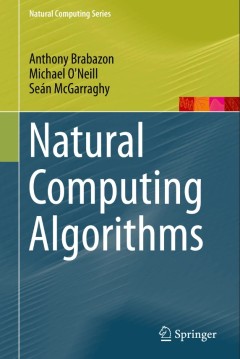
Natural Computing Algorithms
The field of natural computing has been the focus of a substantial research effort in recent decades. One particular strand of this research concerns the development of computational algorithms using metaphorical inspiration from systems and phenomena that occur in the natural world. These naturally inspired computing algorithms have proven to be successful problem-solvers across domains as div…
- Edition
- 1
- ISBN/ISSN
- 978-3-662-43630-1
- Collation
- XX, 554
- Series Title
- Natural Computing Series
- Call Number
- -
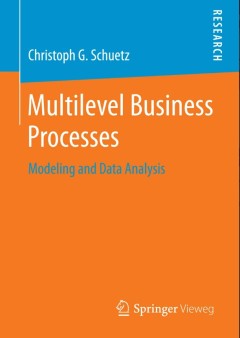
Multilevel Business Processes
Christoph G. Schuetz is a postdoctoral researcher at the Department of Business Informatics – Data & Knowledge Engineering of the Johannes Kepler University Linz, Austria. His research interests include data warehousing, semantic web, business process management, and data privacy.
- Edition
- 1
- ISBN/ISSN
- 978-3-658-11083-3
- Collation
- XXIV, 232
- Series Title
- -
- Call Number
- -

Emerging and Evolving Topics in Multiple Sclerosis Pathogenesis and Treatments
Over the past decade, we have made great advances in the field of multiple sclerosis (MS) research, and this book focuses on those advances in MS pathogenesis and treatment. While some of these advances have been through new approaches and ideas that have emerged in the last decade such as the newly identified protective role that amyloid proteins may play in MS or the use of helminths to treat…
- Edition
- -
- ISBN/ISSN
- 978-3-319-25543-9
- Collation
- XII, 235
- Series Title
- -
- Call Number
- -

The Transnational and the Local in the Politics of Islam The Case of West Su…
This book explores the relationship between transnational and local Islam as expressed in public discourse and policy-making, as represented in the local press. It does so against the background of local governments in majority Muslim regions across Indonesia promoting and passing regulations that mandate forms of social or economic behaviour seen to be compatible with Islam. The book situates …
- Edition
- -
- ISBN/ISSN
- 978-3-319-15413-8
- Collation
- -
- Series Title
- -
- Call Number
- -
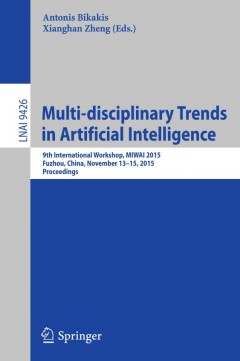
Multi-disciplinary Trends in Artificial Intelligence
This book constitutes the refereed conference proceedings of the 9th International Conference on Multi-disciplinary Trends in Artificial Intelligence, MIWAI 2015, held in Fuzhou, China, in November 2015. The 30 revised full papers presented together with 12 short papers were carefully reviewed and selected from 83 submissions. The papers feature a wide range of topics covering knowledge repres…
- Edition
- 1
- ISBN/ISSN
- 0302-9743
- Collation
- XX, 458
- Series Title
- Lecture Notes in Computer Science
- Call Number
- -
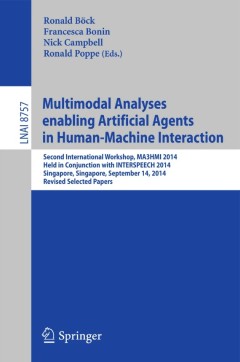
Multimodal Analyses enabling Artificial Agents in Human-Machine Interaction
This book constitutes the thoroughly refereed post-workshop proceedings of the Second Workshop on Multimodal Analyses Enabling Artificial Agents in Human Interaction, MA3HMI 2014, held in Conjunction with INTERSPEECH 2014, in Singapore, Singapore, on September 14th, 2014. The 9 revised papers presented together with a keynote talk were carefully reviewed and selected from numerous submission…
- Edition
- 1
- ISBN/ISSN
- 978-3-319-15556-2
- Collation
- XII, 109
- Series Title
- Lecture Notes in Computer Science
- Call Number
- -
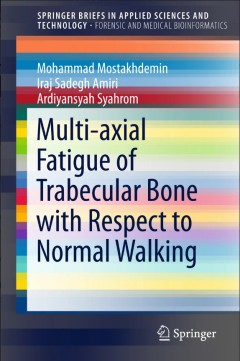
Multi-axial Fatigue of Trabecular Bone with Respect to Normal Walking
This book focuses on the analysis and treatment of osteoporotic bone based on drug administration, tracking fatigue behavior and taking into consideration the mechanical interaction of implants with trabecular bone. Weak trabeculae are one of the most important clinical features that need to be addressed in order to prevent hip joint fractures.
- Edition
- 1
- ISBN/ISSN
- 2191-530X
- Collation
- VIII, 55
- Series Title
- SpringerBriefs in Applied Sciences and Technology
- Call Number
- -

The Towers of New Capital
With mega townships as the tool, this book analyses the complexity, scale and the challenges associated with the development paradigm in India from various built environment lenses. The Towers of New Capital is an enquiry into how these 'global fixes' are leading to territorial reorganization.
- Edition
- -
- ISBN/ISSN
- 978-1-137-58626-1
- Collation
- -
- Series Title
- -
- Call Number
- -
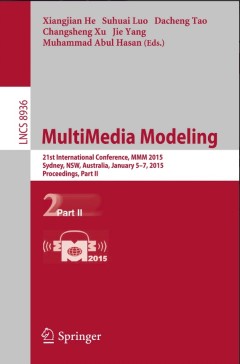
MultiMedia Modeling
The two-volume set LNCS 8935 and 8936 constitutes the thoroughly refereed proceedings of the 21st International Conference on Multimedia Modeling, MMM 2015, held in Sydney, Australia, in January 2015. The 49 revised regular papers, 24 poster presentations, were carefully reviewed and selected from 189 submissions. For the three special session, a total of 18 papers were accepted for MMM 2015. T…
- Edition
- 1
- ISBN/ISSN
- 1611-3349
- Collation
- XXII, 586
- Series Title
- Lecture Notes in Computer Science
- Call Number
- -
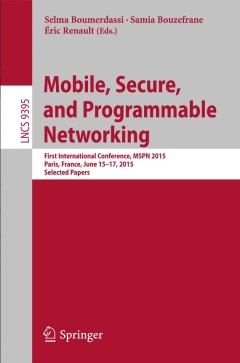
Mobile, Secure, and Programmable Networking
This book constitutes the thoroughly refereed post-conference proceedings of the First International Conference on Mobile, Secure, and Programmable Networking, MSPN 2015, held in Paris, France, in June 2015. The 14 papers presented in this volume were carefully reviewed and selected from 36 submissions. They discuss new trends in networking infrastructures, security, services and applications …
- Edition
- 1
- ISBN/ISSN
- 978-3-319-25743-3
- Collation
- X, 177
- Series Title
- Lecture Notes in Computer Science
- Call Number
- -
 Computer Science, Information & General Works
Computer Science, Information & General Works  Philosophy & Psychology
Philosophy & Psychology  Religion
Religion  Social Sciences
Social Sciences  Language
Language  Pure Science
Pure Science  Applied Sciences
Applied Sciences  Art & Recreation
Art & Recreation  Literature
Literature  History & Geography
History & Geography